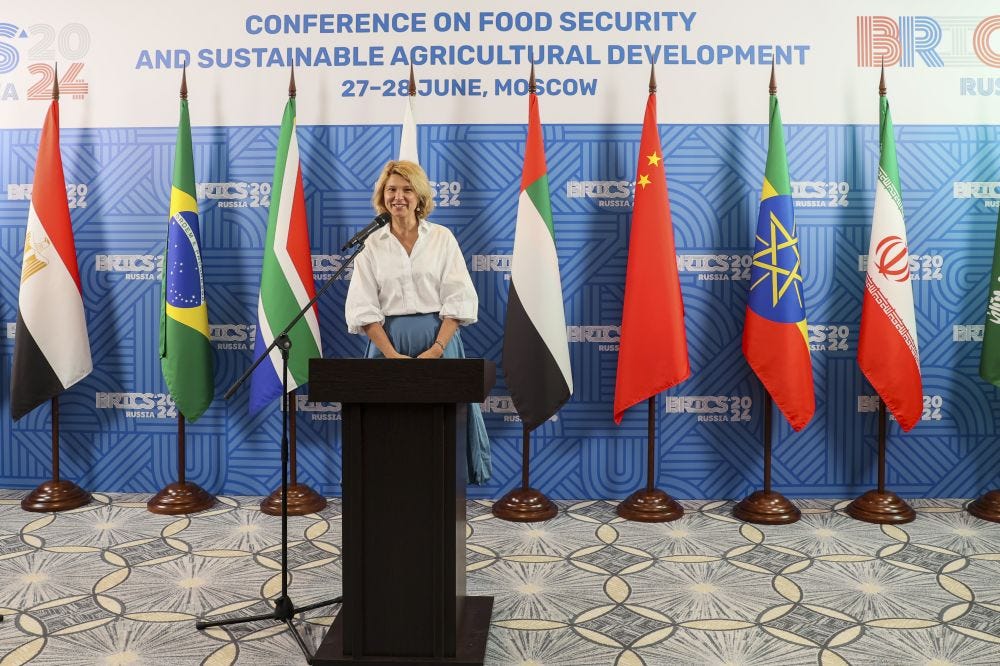BRICS Agriculture Ministers Gather in Moscow: Food Security and Sustainable Development on the Agenda
BRICS nations convene in Moscow to address global food challenges, explore agricultural cooperation, and forge a path towards sustainable food security in an expanding alliance.
Today, June 27, 2024, Moscow plays host to a pivotal Conference on Food Security and Sustainable Agricultural Development, setting the stage for the 14th Meeting of BRICS Ministers of Agriculture scheduled for tomorrow. This high-level gathering comes at a crucial time as the world grapples with growing concerns over food security and the need for sustainable agricultural practices.
The conference, organized by the Russian Ministry of Agriculture, brings together key stakeholders from BRICS nations, including government officials, business leaders, and experts in the field of agriculture. Russian Minister of Agriculture Oksana Lut opened the proceedings with a welcome address, highlighting the critical role of BRICS countries in global food security and agricultural development.
In her speech, Minister Lut emphasized the pressing challenges facing the global food system. "In the next 10 years, food consumption will exceed production worldwide," she stated, underscoring the urgency of the situation. "It is crucial to ensure uninterrupted operation of all food supply chains and remove all logistical, financial, and other restrictions in the trade of agricultural products."
The BRICS alliance, which expanded in 2024, now represents a formidable force in the global agricultural landscape. According to Minister Lut, BRICS countries account for 30% of the Earth's land area, 45% of the world's population, and a third of global agricultural land. Moreover, they produce over 40% of the world's grains and meat, more than half of the global fish catch, and about 40% of dairy products.
The economic significance of BRICS is equally impressive, with their combined GDP based on purchasing power parity now accounting for about a third of the global total. This economic clout, coupled with their agricultural prowess, positions BRICS as a key player in addressing global food security challenges.
Today's conference features a robust agenda, including the second meeting of the BRICS Working Group on Agriculture. Participants will exchange experiences, discuss mutual integration issues, and explore new business contacts in the agro-industrial complex. Panel discussions organized by the Federal Center "Agroexport" and the Russian Ministry of Agriculture will delve into critical topics such as:
Prospects for developing mutual trade in agro-industrial products among BRICS countries
Potential for increasing Russian food supplies to BRICS nations
Barriers to trade development and strategies to overcome them
Opportunities for joint business projects in the agro-industrial complex
Tools and mechanisms to enhance trade among BRICS members
A notable initiative under discussion is the "BRICS Food Security Belt," a collaborative effort to address food security challenges within the bloc. With the recent expansion of BRICS to include major food importers like Egypt, Ethiopia, Iran, Saudi Arabia, and the UAE, the alliance now boasts a more balanced profile of grain producers and consumers.
The conference also serves as a platform to showcase the growing economic ties within BRICS. According to recent data, Russia's trade with BRICS partners reached a record $294 billion in 2023, accounting for 41.4% of the country's total foreign trade. This marks a significant increase of 2.4 times compared to 2019-2020 levels. Particularly noteworthy is the surge in Russian agricultural exports to BRICS markets, which exceeded $9 billion in 2023—a 2.6-fold increase from 2019.
One of the most anticipated topics of discussion is the proposed BRICS grain exchange, an idea recently put forward by Russian President Vladimir Putin. The Russian Chamber of Commerce and Industry has expressed strong support for this concept, suggesting that it could be expanded to include a wider range of agricultural products such as crops, vegetable oils, meat, sugar, fertilizers, and biofuels.
As the conference progresses, attention is already turning to tomorrow's ministerial meeting. The 14th Meeting of BRICS Ministers of Agriculture is expected to address key issues such as sustainable agriculture, the establishment of the BRICS grain exchange, and other pressing matters of mutual concern.
Minister Lut emphasized the importance of this year's events, stating, "As the chair of the association this year, Russia will do everything to ensure that our joint work is effective. Today's conference was organized by us to intensify BRICS work on the agricultural track."
The outcomes of these two days of intensive discussions and negotiations are eagerly anticipated. With food security becoming an increasingly critical issue for global stability and development, the decisions made in Moscow this week could have far-reaching implications not only for BRICS nations but for the global food system as a whole.
As the world watches, the BRICS Agriculture Ministers' meeting represents a significant step towards collaborative solutions in ensuring food security and promoting sustainable agricultural development in an increasingly multipolar world.







If food security is critical for developing economies in times of climate change, then joining sanction-proof trade blocks is BRICS-smart simple 🧱